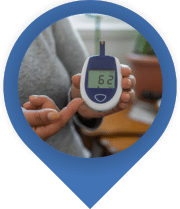The Latest Healthcare News
Check out our blog to learn more from our team about the latest medical advancements, health tips, and primary care news.

At AllCare, we offer comprehensive and personalized diabetes treatment to help individuals effectively manage their condition and improve their overall well-being. Our experienced healthcare professionals are dedicated to providing tailored care, guidance, and support for patients with diabetes.
Diabetes treatment plays a critical role in managing overall health. Effective treatment helps individuals maintain healthy blood sugar levels, reducing the risk of long-term complications such as heart disease, kidney damage, nerve damage, and vision problems. It also helps to control symptoms, improve quality of life, and minimize the impact of diabetes on daily activities. With comprehensive and personalized diabetes treatment, individuals can gain the knowledge, tools, and support needed to successfully manage their condition, achieve optimal health, and lead fulfilling lives.
At AllCare, we provide comprehensive and personalized treatment for individuals with diabetes. Our experienced healthcare professionals understand the unique challenges of managing diabetes and work closely with patients to develop individualized treatment plans. Through a multidisciplinary approach, our team collaborates to optimize blood sugar control, prevent complications that require urgent care, and empower patients to make informed decisions about their health.

Regular tracking and control of blood sugar levels through monitoring techniques to maintain optimal glucose levels and adjust treatment plans as necessary.

Evaluation, management, and prescription of diabetes medications to ensure effective control of blood sugar levels.

Comprehensive education and training on diabetes self-care, including monitoring techniques, medication.

Routine evaluations and monitoring of key health indicators, including blood pressure, cholesterol levels, and kidney function, to detect and address potential complications associated with diabetes.

Treatment and management of diabetes-related complications and comorbidities such as cardiovascular disease, kidney problems, nerve damage and other conditions that require urgent care.

When needed,we provide collaborative referral to specialists, such as endocrinologists or registered dietitians, for specific diabetes-related concerns.

Recognizing the symptoms of diabetes is crucial for early diagnosis and timely intervention. Both Type 1 and Type 2 diabetes have distinct signs that individuals should be aware of. By understanding these symptoms, individuals can seek medical attention promptly and begin necessary treatment to manage their condition.
Type 1 diabetes is characterized by the body’s inability to produce insulin. Symptoms may develop quickly and include:
Type 2 diabetes occurs when the body becomes resistant to insulin or does not produce enough insulin. Symptoms may develop gradually and include:
The primary goals of diabetes treatment include achieving and maintaining healthy blood sugar levels, preventing urgent complications, and improving overall quality of life.
Treatment options for diabetes typically include lifestyle modifications (such as diet and exercise), oral medications, insulin therapy, and other medications to manage blood sugar levels.
The frequency of blood sugar monitoring may vary depending on individual circumstances. It is typically recommended to monitor blood sugar levels regularly, as advised by your healthcare provider.
Following a balanced diet that includes a variety of healthy foods is essential for managing diabetes. Your healthcare provider or a registered dietitian can provide personalized guidance on dietary recommendations based on your specific needs.
Regular physical activity can significantly contribute to diabetes management. Exercise helps lower blood sugar levels, improve insulin sensitivity, maintain a healthy weight, and enhance overall cardiovascular health. Consult with your healthcare provider to develop an exercise plan suitable for your condition.
While alternative and complementary therapies may be of interest to some individuals, it is important to discuss these options with your healthcare provider. Some therapies may have potential benefits but should be used as adjuncts to conventional diabetes treatment, not as replacements.
The frequency of healthcare visits may vary depending on individual factors, including the type of diabetes and overall health. Regular check-ups with your healthcare provider are important to monitor your progress, make adjustments to your treatment plan, and address any concerns or questions you may have.
Check out our blog to learn more from our team about the latest medical advancements, health tips, and primary care news.
The blooming flowers and growing grass can trigger a range of unpleasant symptoms, from sneezing fits and watery eyes, to […]
Read More >Measles is on the rise. As of February 22, 2024, a total of 35 measles cases were reported by 15 […]
Read More >The flu, short for influenza, is a common viral infection that affects the respiratory system. It can lead to various […]
Read More >